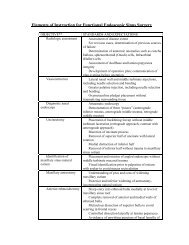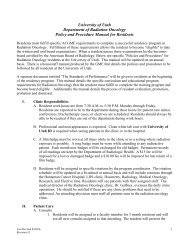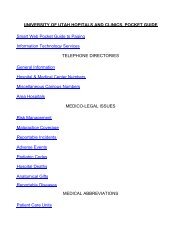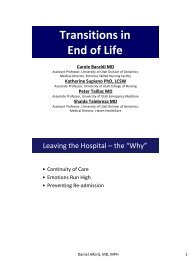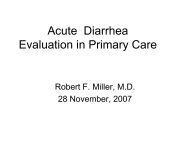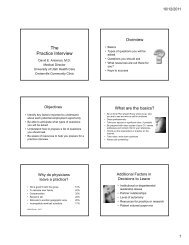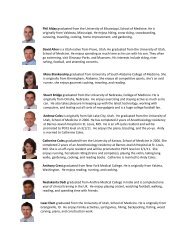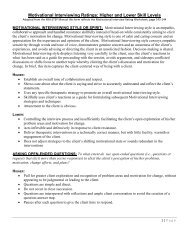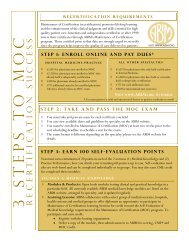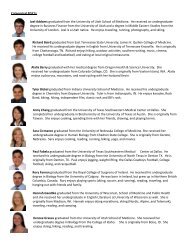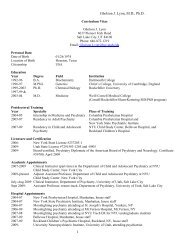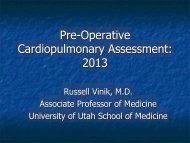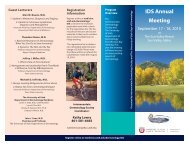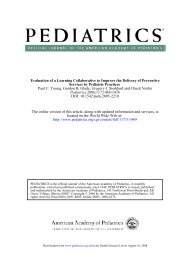2005 Centennial Issue - University of Utah - School of Medicine
2005 Centennial Issue - University of Utah - School of Medicine
2005 Centennial Issue - University of Utah - School of Medicine
Create successful ePaper yourself
Turn your PDF publications into a flip-book with our unique Google optimized e-Paper software.
ALUMNI MEMORIES<br />
RICHARD A. ALDOUS, M.D.<br />
SOM Graduate 1956<br />
Ophthalmology; Private Practice<br />
Dr. Davenport was conducting an experiment in physiology class in which he had to get a student<br />
totally rattled in order to demonstrate some physiological principles (change <strong>of</strong> vital signs, etc.). He<br />
began his lecture by saying that doctors should be cultured people and that he would probably fail<br />
any student who was not well versed in the cultural arts. He then looked directly at Stuart Datt and<br />
said, “Datt, name fi ve operas by Verdi.”<br />
Stuart (instead <strong>of</strong> turning into a basket case) calmly recited more than fi ve operas by Verdi.<br />
The challenge did not even increase his heart rate. Dr. Davenport’s experiment was totally ruined.<br />
What he did not realize was that Stuart was an accomplished musician and an expert in opera,<br />
having grown up in New York City where he had regularly attended the Metropolitan Opera.<br />
EUGENE L. BELLIN, M.D.<br />
SOM Graduate 1958<br />
Internal <strong>Medicine</strong><br />
I’ve regreted not thanking the Admissions Committee for<br />
accepting me, a Jewish person from New York, with a Yale<br />
average <strong>of</strong> only 83, and taking me three thousand miles to<br />
Salt Lake city into a fascinating LDS environment, giving<br />
me a chance to be a doctor—after a rocky medical course,<br />
helped by an understanding faculty (Wintrobe, Holmstrom,<br />
Price, etc.).<br />
KENNETH N. BUCHI, M.D.<br />
SOM Graduate 1978<br />
Internal <strong>Medicine</strong>/Gastroenterology<br />
I remember my fi rst medicine<br />
sub-internship as a new fourth-year<br />
student at the V.A. hospital. This is<br />
when I fi rst felt like I was a physician.<br />
JOHN W. EMMETT, M.D.<br />
SOM Graduate 1952<br />
Radiology<br />
I remember all the<br />
s<strong>of</strong>tball and football<br />
games at noon before I<br />
would sleep through the<br />
pathology lectures in the<br />
“temporary” wooden<br />
Army building behind<br />
the main building.<br />
JOSEPH M. HEATH, M.D.<br />
SOM Graduate 1958<br />
Family Practice<br />
Alumni Notebook<br />
KENNETH D. SHANKLIN, M.D.<br />
SOM Graduate 1967<br />
Plastic Surgeon<br />
I have wonderful memories <strong>of</strong> being the<br />
fi rst class to use the <strong>University</strong> Medical<br />
Center for our clinical years <strong>of</strong> training<br />
and its proximity to the mountains I loved.<br />
I also remember the nightmares I had for<br />
several weeks after our class started cadaver<br />
dissection anatomic training. Then, for an<br />
unknown reason, these nightmares ended<br />
as abruptly as they started. I thought for a<br />
period that I would have to drop out <strong>of</strong><br />
medical school.<br />
We were in our fi rst year, very green, and very apprehensive, wondering if we<br />
were going to make the grade. The fi rst class <strong>of</strong> the day was physiology. No one<br />
will forget the towering, demanding pr<strong>of</strong>essor, Horace Davenport. Every contact<br />
with him brought a combination <strong>of</strong> respect and fear. He usually let us know<br />
that he was condescending to be teaching freshman medical students away from<br />
his beloved Oxford.<br />
One morning during the fi rst few weeks <strong>of</strong> medical school, Herb Spencer and<br />
I walked together, rather hurriedly, as we were a bit late to physiology. As we<br />
walked in the darkened room, the class had already started. For the fi rst time<br />
Dr. Davenport was not teaching the class, I blurted out to Herb quite audibly,<br />
“Where’s Horace?”<br />
When my eyes adjusted to the dark, and I looked around, my heart went in my<br />
throat. Horrifi ed, I discovered the “Horace” was seated directly behind us.<br />
This story has a postlude. I began to feel that my days in medical school may<br />
be numbered. We had a hard test in physiology and were awaiting the results.<br />
A few days later, we were in the physiology lab. I was “wired” with all the<br />
paraphernalia to measure pulse, respiration, and blood pressure under different<br />
conditions. Dr. Davenport walked by in his white coat, and suddenly asked in<br />
his authoritative, Oxfordian voice, “Heath, do you really think you can make<br />
it though medical school?” It was the best example <strong>of</strong> the day <strong>of</strong> the effect <strong>of</strong><br />
emotions on vital signs.<br />
19



